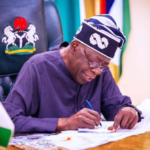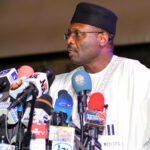
Since my days in and out of public service, I have always felt that something was and is still amiss in the relationship between the African continent and the west.
Beyond the economic struggles of the African countries and the pretentious attempts of the western world to alleviate the precarious situation of the African countries most times, I have always had this feeling that the so-called supports often offered the African countries either by way of aids or loans, are usually not genuine and in good faith.
The trend is not so much different from the pilferage perpetrated by the western countries as colonialists on the African countries, witnessed by most African adults, or read by even the young Africans. At least, the Yoruba say, ti omode o ba ba itan, a ba aroba, aroba yen, baba itan! If a child does not witness an historical event, he would at least meet its narrative.
This equally reminds me of the book, ‘How Europe Underdeveloped Africa’ by Walter Rodney. While we can regard those acts as historical or evolutionary, contemporary events are not so much at variance with the practice. By this I mean that even post-independence Africa is still not so much different from the predicaments experienced during the colonial period.
The exploitation of our people and resources still continues. The only differential is in the methodology and approach. As observed above, it is either the western countries are offering African countries loans under one stringent or hostile condition or the other; or offer of aids which is largely Greek in nature.
Beyond the reluctance most times to transfer technology to African countries, the western powers, through the multilateral institutions, have developed a sophisticated means of exploiting African countries. The world Bank, the International Monetary Fund, the Paris Club etc., in all the facilities offered African countries, the multilateral institutions always make it seem they are doing us a favour.
Regrettably most of the prerequisites to the grant of the facilities are inhuman and hostile to the interest of the people on whose behalf the facilities are being obtained. Most times, the facilities turn out to worsen the poverty of the people rather than alleviate it. I recall the structural adjustment program hitherto imposed on Nigeria during the regime of General Ibrahim Babaginda, similitudes of which many African countries have been forced to swallow over time due to their desperation.
The interesting thing that I noticed during my time in public service is that most of the loans often granted usually have sizeable percentage apportioned to capacity building. As much as I do not quarrel per se with the capacity building component, the challenges that I have is that in some instances, not only do the African countries have the relevant capacities they sought to develop, the trainers/consultants that are beneficiaries of the training contracts are mostly companies and individuals from the western countries.
The simple implication of this invariably is that about forty percent of the granted loans are retained ultimately in the western countries. Few days ago, I stumbled on a video clip in which the Minister for Women Affairs was complaining bitterly about this practice. She did not mince words in condemning the approach in which supposed workshop/seminars are ever devoid of any empowerment component. I feel her in this regard and share her sentiment.
Little wonder therefore that you find citizens of the affected African countries cry foul when they fail to see brick and mortals on the ground. You hardly find the multilateral institutions granting facilities for the actual growth and progress of the countries; and where they rarely do, the contractors end up largely coming from the western countries. It will appear to simply be job for the boys. Once it appears not feasible to corner the contracts, the probability of the loan application sailing through is remote.
I remember, as the Commissioner in charge of the environment and responsible for drainage issues in Lagos State, funding support by way of facility was solicited from the World Bank. Towards the tail end of the negotiation, the appointed consultant of the World Bank, certainly not a Nigerian, came up as part of the package the expenditure of almost three billion naira then as compensation to the trespassers of the canal banks/setbacks.
All attempts to persuade the World Bank that such expenses were unnecessary as the trespassers would willingly remove the offensive structures, recognizing the illegality of the construction, and that even where removal by the state government under the relevant laws was compelled, the trespassers would have to pay for the service, fell on deaf ears.
It took the braveness of the then Governor, Babatunde Fashola, SAN to rebuff them and proceeded to provide funds within the State appropriation. Slightly over a year that the World Bank officials returned, they witnessed the completion of virtually all the drainage works they had refused to fund and were stunned at the achievement, particularly with no resistance recorded from the trespassers as anticipated by the World Bank.
Imagine the situation in which almost three billion naira applied to the concrete works had been dissipated into paying unwarranted compensations canvassed by the World Bank. The same logic applies to the so-called aids granted by them; these are mostly tied to one absurd requirement or the other; or virtually meaningless in impact. Interestingly, this is not the intended focus of this intervention.
My destination actually is that of the role of the western powers in engendering of bad governance in Africa. There is hardly any facility granted to an African country without good governance structure being a pre-requisite. A peep into the concept of good governance from the western perspectives is the creation of structures simpliciter. They often forget that structures without human capital is a misadventure. This is where my issues arose with the western world and the African leaders.
I had about two weeks ago in my X account raised the issue about how the western countries, through the instrumentality of politically exposed persons sold to the world, have succeeded in isolating the African bests from participating in the affairs of their various countries in any public capacity. Even, those acting in judicial capacities are not equally spared.
Generally speaking, there is nothing offensive to my mind about the concept but my grudge is with the discriminatory application. Apart from the discriminatory application of the doctrine, wherein citizens of the western countries that served and participated in the governance of their countries are not precluded from moving progressively with their lives outside the shores of their countries after service, ex-public officials of African descent that participated in governance affairs of their countries are declared outcasts. They are simply no-touch for international economic activities again where they are desirous. The writer has been a victim of this in two separate instances. I have had a situation in which I was approved for the Board membership of a multinational company, just to be ultimately denied the position on ground of having served my State in Nigeria.
Years after I had left public service again, I was brought in as shareholder of a Dubai-based company, and just again to be forced out as the Banks will not open Accounts for the company due to my presence on the Board as a person declared to politically exposed. Beyond these my personal experiences, I am aware of the case of a very Senior Advocate of Nigeria, highly successful in his right, who was made the Chairman and Pro-chancellor of a university, wherein he was not only donating his personal resources to the development of the institution but raising funds trough his associates, friends and clients to support the institution. In not quite a distance, his bank account, opened and run for several decades, was automatically closed in England.
Similar fate befell another Nigerian successful business man that had never been in partisan politics, much less public office, but was invited to chair a trust fund for the accomplishment of the public good. Again, he was not only coughing out huge donations towards the causes, but mobilizing resources through other means for the trust. All his business transactions abroad, not only became endangered but impaired consequently.
The innocent man had to resign and still battling with the resurrection of his international businesses. These are just few of the instances or narratives I can detail out here, many abound all over the African countries. The implication of the above is that the African finest are now drifting away from participating in the governance of their various countries.
In Nigeria, it is bad enough that most of our finest stay away from partisan politics due to the various indecencies plaguing it, now even to invite them to assist in navigating the difficult terrains where they have expertise is now being consistently declined. What then is happening across the African continent is the population and proliferation of the public service with the dregs. One then needs no soothsayer to tell him the multiplier effects on good governance.
You certainly cannot have good governance where the drivers of the institutions are not only inept but incompetent. It is therefore hypocritical for the west to be advocating good governance in Africa on the one hand, while on the other strewing thorns on the ways of the real actors, the African best.
My recollection of even the essence of declaring persons in public service or former political office holders as politically exposed persons is essentially to be able to monitor their activities, particularly finances, so as to track any suspicious transaction; and certainly not to stigmatize them. The scenario as it is unfolding is that those categories of people are now presumed to be criminals who must be avoided at all costs. The worst effect of this is that even innocent Nigerians without an iota of public service, once unscrupulously accused of any misconduct on our deregulated and unguided social media, are affected by the same adverse media.
The veracity or otherwise of social media allegations are hardly interrogated or investigated by most compliance team members of the various institutions, financial or otherwise abroad. Regrettably in the face of all these, the African leaders appear not to have noticed this and act appropriately. Until African leaders rise up in unison to condemn this, the ability to attract the best Africans into governance will continue to be impaired. This is the sad story of Africa today.
Thus, no matter how much noise we make in striving to attract our best into governance, particularly those in diaspora, the efforts are not likely to yield any fruit until those impediments are removed.
The time is ripe for African leaders to initiate and pursue the removal of this stigma on the ex and serving African public officials, individually and collectively. The African parliamentarians and the Presidents, including the heads of judicial institutions of the African countries must trigger the crusade and pursue same until it is realized.
The western conspiracy and pretext of promoting good governance must be considered a smokescreen which must be shattered urgently if the African countries must attract their best into public governance.







